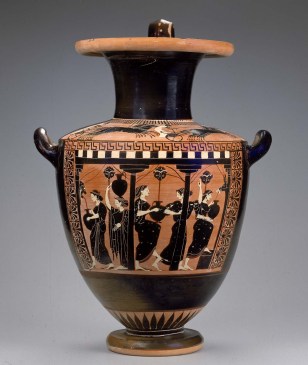Diogenes Laertius, Lives of the Philosophers 8.41
“For [Hermippos] says that when Pythagoras was in Italy he built a little home in the ground and told his mother to write down on a tablet what happened and the time and then to send it down to him until he came up again. His mother did that.
Later, when Pythagoras finally came up again he was shriveled and almost a skeleton. After he came to the assembly, he was saying that he came from Hades. Then he read aloud to them what had happened. And they were overwhelmed by what he said, crying and weeping and believing that Pythagoras was divine. They believed it so much that they gave him their wives so that they might learn some of his philosophy from him. They were called Pythagorean Women. Well, that’s what Hermippos says…”
λέγει γὰρ ὡς γενόμενος ἐν Ἰταλίᾳ κατὰ γῆς οἰκίσκον ποιήσαι καὶ τῇ μητρὶ ἐντείλαιτο τὰ γινόμενα εἰς δέλτον γράφειν σημειουμένην καὶ τὸν χρόνον, ἔπειτα καθιέναι αὐτῷ ἔστ’ ἂν ἀνέλθῃ. τοῦτο ποιῆσαι τὴν μητέρα. τὸν δὲ Πυθαγόραν μετὰ χρόνον ἀνελθεῖν ἰσχνὸν καὶ κατεσκελετευμένον· εἰσελθόντα τε εἰς τὴν ἐκκλησίαν φάσκειν ὡς ἀφῖκται ἐξ Ἅιδου· καὶ δὴ καὶ ἀνεγίνωσκεν αὐτοῖς τὰ συμβεβηκότα. οἱ δὲ σαινόμενοι τοῖς λεγομένοις ἐδάκρυόν τε καὶ ᾤμωζον καὶ ἐπίστευον εἶναι τὸν Πυθαγόραν θεῖόν τινα, ὥστε καὶ τὰς γυναῖκας αὐτῷ παραδοῦναι, ὡς καὶ μαθησομένας τι τῶν αὐτοῦ· ἃς καὶ Πυθαγορικὰς κληθῆναι. καὶ ταῦτα μὲν ὁ Ἕρμιππος…
There is another version of this in the Scholia to Sophocles’ Elektra 62-64
“Pythagoras confined himself in an underground hole and told his mother to tell people that he had died. When he reappeared, he told a lot of marvelous tales about resurrection and the things which happen in the underworld, and, to the living he related a full account of all the companions he happened to meet in the underworld; from this arose the belief that he was Aithalides son of Hermes before the Trojan War, then Euphorbus, then Hermotimus, then Pyrrhus the Delian, and then finally Pythagoras. Sophocles seems to be hinting at this story. Some assert, though unpersuasively, that the lines are aimed at Odysseus. But this is unconvincing, because Odysseus never did anything of the sort.”
ἤδη γὰρ εἶδον πολλάκις Πυθαγόρας καθείρξας ἑαυτὸν ἐν ὑπογείῳ λογοποιεῖν ἐκέλευσε τὴν μητέρα ὡς ἄρα τεθνηκὼς εἴη καὶ μετὰ ταῦτα ἐπιφανεὶς περὶ παλιγγενεσίας καὶ τῶν καθ’ ῞Αιδου τινὰ ἐτερατεύετο διηγούμενος πρὸς τοὺς ζῶντας περὶ τῶν οἰκείων οἷς ἐν ῞Αιδου συντετυχηκέναι ἔλεγεν ἐξ ὧν τοιαύτην ἑαυτῷ δόξαν περιέθηκεν ὡς πρὸ μὲν τῶν Τρωικῶν Αἰθαλίδης ὢν ὁ ῾Ερμοῦ, εἶτα Εὔφορβος, εἶτα ῾Ερμότιμος, εἶτα Πύρρος ὁ Δήλιος, εἶτα ἐπὶ πᾶσι Πυθαγόρας· εἰς τοῦτο οὖν ἔοικεν ἀποτείνεσθαι ὁ Σοφοκλῆς· ἔνιοι δὲ οἴονται ἀπιθάνως εἰς ᾿Οδυσσέα ἀποτείνεσθαι· οὐ γὰρ πέπρακταί τι τοιοῦτον ᾿Οδυσσεῖ·
Diogenes Laertes, Pythagoras 29
“The most famous women Pythagoreans were: Timukha, the wife of Mullias of Kroton, Philtus, the daughter of Theophoris of Kroton amd sister of Bundakos, Okellô and Ekkelô, the sisters of Okkelos and Okkilos of Leukania, Kheilonis, the daughter of the Spartan Kheilôn, Kratêsikleia, a Spartan and wife of Kkleanôr the Spartan, Theano, the wife of Brotinus of Metapontos, Muia, the wife of Milo of Kroton, Lastheneia from Arcadia, Habroteleia the daughter of Habrotelos the Tarentinian, Ekhekrateia from Phlius, Tyrsênis of Sybaris, Pesirrodê of Tarantum, Theadousa the Spartan, Boiô the Argive, Babeluka the Argive, and Kleaikhma the sister of Autokharidas of Laconia. There are seventeen in total.”
[29] Πυθαγορίδες δὲ γυναῖκες αἱ ἐπιφανέσταται· Τιμύχα γυνὴ Μυλλία τοῦ Κροτωνιάτου, Φιλτὺς θυγάτηρ Θεόφριος τοῦ Κροτωνιάτου, Βυνδάκου ἀδελφὴ, Ὀκελλὼ καὶ Ἐκκελὼ <ἀδελφαὶ Ὀκκέλω καὶ Ὀκκίλω>1 τῶν Λευκανῶν, Χειλωνίς θυγάτηρ Χείλωνος τοῦ Λακεδαιμονίου, Κρατησίκλεια Λάκαινα γυνὴ Κλεάνορος τοῦ Λακεδαιμονίου, Θεανὼ γυνὴ τοῦ Μεταποντίνου Βροτίνου, Μυῖα γυνὴ Μίλωνος τοῦ Κροτωνιάτου, Λασθένεια Ἀρκάδισσα, Ἁβροτέλεια Ἁβροτέλους θυγάτηρ τοῦ Ταραντίνου, Ἐχεκράτεια Φλιασία, Τυρσηνὶς Συβαρῖτις, Πεισιρρόδη Ταραντινίς, Θεάδουσα Λάκαινα, Βοιὼ Ἀργεία, Βαβέλυκα Ἀργεία, Κλεαίχμα ἀδελφὴ Αὐτοχαρίδα τοῦ Λάκωνος.
αἱ πᾶσαι ιζʹ.

